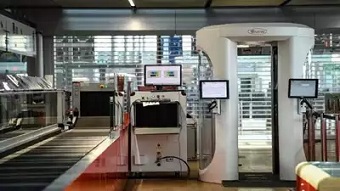The government has given a push for the installation of full-body scanners at airports here, after Covid significantly delayed the process. The Bureau of Civil Aviation Security (BCAS) has ordered all hypersensitive and sensitive airports to replace door frame metal detectors (DFMD) with scanners by March 2022. And other airports will need to replace DFMDs with scanners “latest by” next December. BCAS has directed all airports to have at least one set of DFMD for screening persons with medical conditions, the order says.
Whether Covid-ravaged airport operators can meet this timeline remains to be seen as a scanner costs upwards of Rs 3 crore. Comments were sought from airport operators on this issue and awaited till the time of going to press. The list of sensitive airports includes those in Jammu, Kashmir, Delhi, Mumbai, and the Northeast. Some airports had successfully done trial runs for this technology in pre-Covid times.
BCAS had in April 2019 directed that 84 hypersensitive and sensitive airports should get full-body scanners by March 2020 in place of DFMDs. Other airports were supposed to get scanners by March 2021. The Airports Authority of India (AAI) had in 2019 issued a tender to buy 198 body scanners. But this entire process has been majorly delayed by Covid, among other things.
“Airport operators have been citing poor financial health. Also, the Central Industrial Security Force (CISF) is in favor of using a combination of handheld metal detector and body scanners for foolproof frisking for passengers on a random basis. A majority of passengers will walk through scanners while some will be screened as per current method,” say officials.
Incidentally, CISF saw demand for the installation of full-body scanners at airports by some representatives of people with disabilities at a mega-conference it had recently organised.
Body scanners will enable doing away with the current process of performing pat-down of passengers after a primary screening process through the walk-through metal detector. Body scanners will enable “clean” passengers to walk through and frisking will be done only for others. The specifications for scanners to be used in India factor in the need to penetrate layers of clothes unique to the country — like chunnat (front fold) of a sari, lungi and pallus.
“There were some very minor issues with scanners when the issue was last discussed some time back. Hopefully, now there will be better and safer technology available for them,” said officials.








